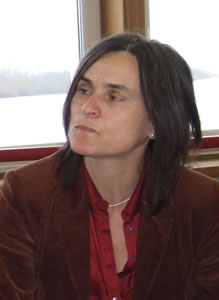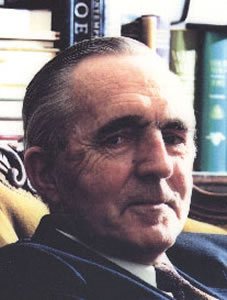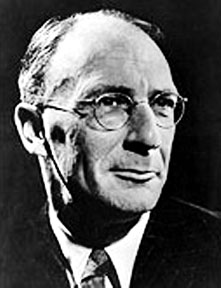De Belgische dichter en schrijver Tom Lanoye werd geboren te Sint-Niklaas op 27 augustus 1958. Zie ook mijn blog van 27 augustus 2006 en ook mijn blog van 27 augustus 2007.
Uit: Kartonnen dozen
“De stilte viel toen een brede man met opgezette wangen, de woordvoerder van het fonds, het spreekgestoelte beklom. Na een theatrale pauze, waarin hij, zo leek het wel, elk kind afzonderlijk in de ogen trachtte te kijken, heette hij met ronkende stem iedereen hartelijk welkom, het jonge volkje in het bijzonder, en bezong vervolgens tot in de details ons nakende verblijf in de Ardennen, alsmede de inspanningen die het fonds en zijn medewerkers niet zouden nalaten zich daarbij te getroosten. Hij bleef maar praten en bezingen, tot het gekuch en het geschuifel, geproduceerd door ouders die wel wat beters hadden te doen, ook hem begonnen op te vallen. Met een sobere volzin sloot hij zijn uiteenzetting af, wenste de tienjarigen een heilzaam verblijf toe in de gezondste streek van West-Europa, dankte de aanwezige verwekkers voor het in het fonds gestelde vertrouwen, en gaf toen, eindelijk, met een hoofdknik aan zijn assistentes het sein voor de verdeling van de kartonnen dozen. Voorlopig echter waren deze dozen nog geen dozen. Ieder kind in het feestlokaal van de Christelijke Mutualiteiten kreeg twee bladen zo groot als een halve deur, van een weerbarstig dik en bruin karton waarin tal van vouwlijnen waren geperst. Op een van beide bladen stonden aan één kant ook zwarte lijnen en stippellijnen gedrukt, zoals die op de achterkant van een uitvergrote ansichtkaart zouden staan. Dit bedrukte blad was het deksel, het andere blad de bodem van een doos die thuis na enig gepuzzel en plakwerk zou ontstaan en de afmetingen zou hebben van een reiskoffer. En dat was het ook. Mijn eerste reiskoffer. Mijn eerste kartonnen doos.”

Tom Lanoye (Sint-Niklaas, 27 augustus 1958)
De Belgische schrijfster Kristien Hemmerechts werd geboren in Brussel op 27 augustus 1955. Zie ook mijn blog van 27 augustus 2007.
Uit: Een zuil van zout
“Er komen nog meer mensen de kerk binnen, maar ze nemen allemaal plaats in de rijen achter ons. Ik voel me veilig onder de sluier, vrij om te huilen of niet te huilen, gebeden te prevelen of niet, mijn ogen open te houden of niet. De pastoor begint te praten over ‘pepe’ dit en ‘pepe’ dat en het duurt even voor ik besef dat hij het over mijn vader heeft.
‘Noemden jullie papa “pepe”?’ fluister ik tegen mijn schoonzus.
‘Neen, nooit,’ fluistert ze terug.
‘Misschien zitten we bij de verkeerde begrafenis,’ fluister ik, maar Eva wijst met haar kin naar de kransen op de kist waarvan althans de opschriften kloppen.
‘Misschien heeft de pastoor zich van begrafenis vergist,’ fluister ik, maar Eva reageert niet. Ik kijk rond en herken familieleden, buren van vroeger, kennissen. Geen van hun gezichten verraadt v
erwondering, laat staan verbijstering.
‘Pepe was een graag geziene gast. Waar hij ook…’
Er is gestommel in de kerk en ook mijn broer en zijn vrouw verlaten hun plaats om de hostie te ontvangen . Net als iedereen sta ik op, maar in plaats van aan te schuiven in een van de twee rijen langs de lijkkist, begeef ik me via de zijbeuk naar buiten.”

Kristien Hemmerechts (Brussel, 27 augustus 1955)
De Australische dichter, schrijver en journalist David Rowbotham werd geboren in Toowoomba.in de Darling Downs van Queensland op 27 augustus 1924. In WO II diende hij aan het front in de Grote Oceaan. Hij studeerde aan de University of Queensland en werkte vele jaren als journalist. Rowbotham onderhield heel wat internationale contacten en reisde vaak naar de VS. In 1994 verschenen zijn Selected Poems, waarin zijn werk over een periode van vijftig jaat verzameld was. Dat hij nog lang niet uitgeschreven was bewezen zijn veel geprezen Poems for America die in 2002 verschenen. In 2007 ontving hij de Patrick White Award.
HARD AS ROCK
Hard as rock, I hide where you hide,
behind the abdication of Fontainebleau:
every boy an emperor! The rain remembers
as you do. Treading gutters home
to malodorous castles in forests of afternoon,
we spent ourselves shouting like Napoleon.
We were granted the principality of islands
hard as rock. We had worn a continent down.
The day was crazed, as if it had dismounted
from its only eminence to stand beside
an ordinary horse. How many of us forage
as we ravage greenslopes for unavailable courage?
Hidden with you behind my bedrock eyes,
I watch bystanders for possible enemies
as all little majors who are emperors do,
and ride helter-skelter after spectres of Fontainebleau.
HEARTLAND
I close my eyes, I see the distance dance,
I hear the detonation of mischance
that fused the sand to glass and blew the light
to blazes. The ri
vers of my heartland wait.
I call them Mississippi and Missouri,
great arteries of the inch and wild heart cherry,
and I sleep in winter with beasts that want my night.
I am their calm and warmth; my stove in the barn
grazes the snow for them; and rivers stay born.
Because I have lived with the eagle of the prairie,
I am this continent as long as its rivers last
and no reaction burns them to old rope.
An image has been taken from an anxious past
that shrinks them; and what may be, is heartless hope.
THE TRAVELLING HOUSE
Time is a house that travels, jogging down
by horse and buggy to the parkland of the town
where grandfather dismounts to give it a show of draughts;
the board was metal and its pieces slung by shafts.
He grooms his beard and wins the mornings for me
in matches beneath the pepperina tree.
I hand the mornings to my mother on her knees
where they shine like a last resort and the checkered years
cease to crown us with their scrubbing pain;
the house was time in a corrugated lane.
I pass them towards my father’s hammering lunch
and there they warm white knuckles at a bench.
This was my house and the givers of mornings it won;
and it stands like the house I am that I pass on.

David Rowbotham (Toowoomba, 27 augustus 1924)
De Britse schrijfster Norah Lofts werd geboren op 27 augustus 1904 in Shipham, Norfolk als Norah Robinson. Zij schreef meer dan vijftig boeken, merendeels historische romans, maar ook non-fictie en korte verhalen. Onder het pseudoniem Peter Curtis schreef zij ook detectives. Haar historische romans zijn in twee soorten te verdelen: biografische romans over koninginnen als Anne Boleyn en Catharina van Aragon, en romans die spelen in East Anglia in het fictieve stadje Baildown, (gemodelleerd naar Bury St. Edmunds). Verschillende van haar boeken werden ook verfilmd.
Uit: The Concubine
“BLICKLING HALL, NORFOLK. OCTOBER 1523
The serving woma
n went and knelt by the hearth and busied herself with the kindling of the fire. Every movement, every line of her body, proclaimed that she was making a concession to unusual circumstance. Fifteen years and almost as many small promotions lay between her and such a lowly task: but the room, the whole house except for the kitchen, was as cold and damp as the grave, and what was left of the household was in that state of disorganization possible only to one caught unawares in the moment of relaxation following a visit from its master who has just departed and unlikely to return for some time. So Emma Arnett, a practical woman, was lighting the fire.
She had, after all, been specially charged to look after her new mistress, the pale, thin girl, stony-eyed with misery, who now stood, still in her damp riding clothes, staring out at the lashing rain. It had rained almost all the way from London, and the state of the roads had added at least two days to the miserable journey. Unless the girl were soon warmed, and coddled a little, she’d come down with a cold, and to judge by the look of her, she was in no state to shake off even the most trivial indisposition.
“Even the wood is damp,” Emma said. “Or I’ve lost my knack.”
It was as well to draw attention to the fact that she, Lady Lucia’s personal body-servant, was down on her knees, blackening her hands, doing a kitchen slut’s work.
“It doesn’t matter,” the girl said in a dull, indifferent way. “We can go to bed.”
“That we can’t do, yet. Apart from the servants’ pallets there’s not a bed in the house fi t to sleep on. Those Sir Thomas and his company used, that might have been aired, are all out in the barn, emptied and being picked over. He complained that they were lumpy, as I’ve no doubt they were. That slit-eyed rogue that calls himself steward is as fi t for the job as I am to be Master of Horse.”
The window rattled under the onslaught of wind and rain; what little smoke had gathered in the chimney gushed out again and drifted about the room.
“A fine homecoming,” Emma Arnett said.
The girl brought her hands out from under her arms and began to rub them together.”

Norah Lofts (27 August 1904 – 10 September 1983)
De Engelse schrijver Cecil Scott Forester (pseudoniem van Cecil Lewis Troughton Smith) werd geboren in Cairo, Egypte, op 27 augustus 1899. Zie ook mijn blog van 27 augustus 2007.
Uit: Hornblower and the Atropos
“Having climbed through the locks, the canal boat was now winding over the pleasant Cotswold country. Hornblower was bubbling with good spirits, on his way to take up a new command, seeing new sights, travelling in an entirely new way, at a moment when the entirely unpredictable English weather had decided to stage a clear sunny day in the middle of December. This was a delightful way of travelling, despite the cold.
“Your pardon for a moment, ma’am,” said Hornblower.
Maria, with the sleeping little Horatio in her arms, gave a sigh at her husband’s restlessness and shifted her knees to allow him passage, and he rose under the restricted height of the first-class cabin and stepped out through the forward door into the open bow of the passage boat. Here he could stand on his sea-chest and look round him. She was a queer craft, fully seventy feet long and, judging by eye as he looked aft, he would think hardly five feet in beam – the same proportions as had the crazy dugout canoes he had seen in use in the West Indies. Her draught must be less than a foot; that was clear as she tore along behind the cantering horses at a speed that must certainly be all of eight knots – nine miles an hour he told himself, hurriedly, for that was the way they measured speeds here inland.
The passage boat was making her way from Gloucester to London along the Thames and Severn Canal; going far more smoothly than the stage coach, it was very nearly as fast and decidedly cheaper, at a penny a mile, even in the first class. He and Maria with the child were the only first-class passengers, and the boatman when Hornblower had paid the fares had cocked an eye at Maria’s condition and had said that by rights they ought to pay two children’s fares instead of one. Maria had snorted with disdain at such vulgarity, while the onlookers chuckled.”

Cecil Scott Forester (27 augustus 1899 – 2 april 1966)
